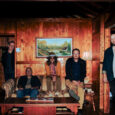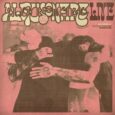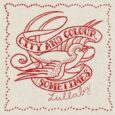I THINK I’M PARANOID
A CONVERSATION WITH JIM LINDBERG OF THE BLACK PACIFIC
Jim Lindberg is a legend in the skate punk scene and an excellent frontman for Hermosa Beach punk band Pennywise. Chances are you have head-banged along to classic Pennywise tracks like “Knocked Down”, “Bro Hymn”, or “Alien” while at a sporting event. Along with Pennywise, Lindberg also has another musical project called The Black Pacific, which is just as good. Recently, I had the opportunity to talk to Lindberg about The Black Pacific’s upcoming album Here Comes Our Wave and his career.
Reflecting on what made him decide to release another The Black Pacific album, Lindberg says, “I have a bunch of songs that I’ve been working on the last 20 years and had all these demos on hand. I wasn’t getting any younger, so I figured it was time to go into the studio and start recording some of them. Everyone in Pennywise was busy doing other things so I got back together again with my friend Alan Vega, who’s a great drummer. He worked on a lot of these songs with me when we were doing the first Black Pacific album… It just felt like the right time to put it out.”
The creative process for Lindberg is usually the same as he notes, “For me personally it’s pretty much I pick up an electric guitar and start playing and see what inspiration comes to me. It’s always like that way when I write a song.” With Pennywise, Lindberg mentions that it is more of a collaborative process; meanwhile, the creative process for The Black Pacific’s latest album is quite different, as he highlights, “That’s all me. I’m playing the guitar, playing the bass, singing, doing the background vocals and Alan is doing the drumming.”
The song “Here We Come” deals with the constant threat of AI taking over people’s jobs. Lindberg gives his thoughts on the possibility of AI replacing musicians in the near future, exclaiming, “I think there can be incredibly rewarding discoveries and inventions with AI if it’s used properly and ethically. At the same time, when you’re talking about music, it’s a perfect example of how it can go wrong. Someone could say, ‘I want a Pennywise song for my Pepsi commercial.’ They can create an artificial intelligence band that sounds like Pennywise. Then we’ll say, ‘Wait a minute, that sounds an awful lot like Pennywise, our band.’ All they have to do is change the algorithm a little bit, so it sounds just enough not like Pennywise to get the job done. The same can be said for any intellectual property, whether it’s writing a score for a film, a book, or a movie script. You could say, ‘I want you to make a horror film that’s exactly like what Quentin Tarantino and Alfred Hitchcock would do if they made a film together,’ and the computer could spit that out in a second. When it comes to the intellectual property values, it’s a little scary for people.”
Songs “I Think I’m Paranoid” and “No Fun” tackles many issues, including senseless violence, terrorism, hate groups, divisiveness, conspiracies, an increasingly scary world filled with hate, and dictators inflicting chaos and death on innocent people. Commenting on why he wrote these songs, Lindberg says, “I’ve been writing songs about impending doom for a long time, and a lot of it has to do with corporate greed, the need for political power by many entities in the world coming together to form these groups that end up being a huge monster that has an unquenchable thirst for power, money, and glory. It’s a really deranged system that comes out of that, that really devalues human life and the life of the planet, not to mention everything that’s happening to the oceans and the climate. Stuff like killer bees, pandemics, and abusive priests, there’s a lot to be concerned about out there. I think sometimes by pointing out all the problems I’m hoping that it’s alarming enough for people that we try and find some answers and solutions and try to be a little more rational when we confront these kinds of problems.”
There are a few hopeful and relaxing tracks on the album, too. “Float Away” and “Won’t Let You Down” are, as Lindberg remarks, “Both love letters to my wife of 30 plus years. She’s been with me longer than Pennywise has been with me. She raised our kids, and we’ve been best friends for years and years. [“Won’t Let You Down”] is exactly what it says. Our kids now have all moved out, they’ve all gone through university and are off doing their own things. We’re kind of empty nesters now. It’s kind of looking back and saying we can watch the sunsets now and enjoy them as a job well done. Now we can hopefully relax a little bit. But I’m basically saying we’re gonna stick through this together till the end.”
Skate punk was one of the most popular genres of the ‘90s and early 2000s, and Pennywise was one of the leading members of the genre. Looking back at being part of the peak of skate punk, Lindberg states, “It was a trip. It happened very fast. I think there was this combination of things that happened at exactly the right time. We started just before it happened. We were listening to Bad Religion’s Suffer album a lot and realized that we all grew up on fast skate punk and wanted to keep playing that. We were working on songs in our little garage and started recording some stuff. At the same time, this real revolution was happening in the world of action sports; skateboarding, surfing, and snowboarding were becoming very popular. These are high-end, adrenaline sports where you really need a lot of courage to perform them. Our music as a soundtrack fit perfectly with that extreme vibe: being able to surf giant waves or ride your motorbike off huge jumps. That whole community just completely embraced us, which was good for us because that’s who we are. We all grew up surfing, skateboarding, snowboarding, and riding dirt bikes. I think that combination, along with the help of Kelly Slater, Tony Hawk, Steve Caballero, and all these great names helping out in the action sports world. It was the perfect timing for the whole Warped Tour skate punk revolution to happen.”
Lindberg still loves to surf and spends as much time as he can out in the water. However, it has never been a competitive thing for him. He states, “I was always the one making jokes, trying to stand on my head on my surfboard, and just goofing off. I love the comradery of it and enjoy myself out there. It is still a real healing place for me to go and just relax. It’s not competitive at all, and that’s a good thing.”
Along with his work in music, Lindberg has also written a book titled Punk Rock Dad: No Rules, Just Real Life, which later inspired the documentary The Other F Word. Both explore the relationship between being a responsible role model for your children while simultaneously being in a punk rock band, a genre known for being anti-authoritarian and anti-establishment. Lindberg says, “I think the most important thing is, and Flea from the [Red Hot] Chili Peppers put it very well in the film The Other F Word, is that you really have to be present for your kids when you’re there. You can’t have your mind somewhere else or not pay attention to what’s going on. [You need to] pay attention to your kids’ real needs all the time. You have to have patience, and like I said in my book, you got to set the ground rules in advance. Every time you go to a restaurant, you have to explain how kids are supposed to behave in a restaurant or how they behave on a playground without being so strict that you’re a military Sergeant, but more of being like, ‘this is how we behave here and later on we can play.’ It’s always been about setting the ground rules. Even though [“Fuck Authority”] in my band [Pennywise] is about rules and breaking them at will. I’m a hypocrite in that sense.”
Lindberg graduated with a major in English at UCLA. His time there deeply impacted his songwriting as it is where he discovered the transcendentalist writers Ralph Waldo Emerson and Henry David Thoreau. Both are huge influences on his songwriting. He notes, “I’ve always said they were the two real first punk rock philosophers in the world in that a lot of their writings were about self-reliance, not following fashion, and creating your own rules in life, and that’s punk rock 101 right there. Also, Thoreau wrote Civil Disobedience which was cited later by Martin Luther King Jr and [Mohandas] Gandhi and all these very powerful leaders in the world of how we dissent against government and oppression and do it the proper way. About trying to reduce violence, chaos, and destruction in the world. Reading these authors and anyone from [William] Shakespeare, [Geoffrey] Chaucer, Graham Geene, Kurt Vonnegut, my Breakfast Of Champions shirt (holds up his shirt). Any kind of edgy writing out there. I loved Jack Kerouac. I loved Cormac McCarthy; huge influence on me. I just love reading books, and my wife is going to kill me if I buy one more book. I’m surrounded by them. I love reading and writing, and Black Pacific and Pennywise are just an extension of that. Trying to put the words out there.”
Before the end of the interview, Lindberg gives three book recommendations: his book Punk Rock Dad: No Rules,Just Real Life, Cormac McCarthy’s The Road, and Breakfast of Champions by Kurt Vonnegut. “I’m particular to Punk Rock Dad,” laughs Lindberg. “Punk Rock Dad, Breakfast of Champions, it’s a tossup.”











